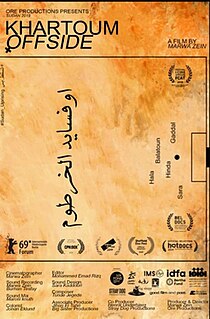Related Research Articles

Cinema of Africa is both the history and present of the making or screening of films on the African continent, and also refers to the persons involved in this form of audiovisual culture. It dates back to the early 20th century, when film reels were the primary cinematic technology in use. During the colonial era, African life was shown only by the work of white, colonial, Western filmmakers, who depicted Africans in a negative fashion, as exotic "others". As there are more than 50 countries with audiovisual traditions, there is no one single 'African cinema'. Both historically and culturally, there are major regional differences between North African and sub-Saharan cinemas, and between the cinemas of different countries.

The history of the Jews in Sudan goes back to when a small but vibrant community of Jews lived in Sudan from about 1885 to around 1970, with most of the community leaving for Israel or Europe after anti-Semitic attacks began to spread against both the Jews in Israel and those still living in Sudan.
Gadalla Gubara was a Sudanese cameraman, film producer, director and photographer. Over five decades, he produced more than 50 documentaries and three feature films. He was a pioneer of African cinema, having been co-founder of both the Pan-African Federation of Filmmakers FEPACI and the FESPACO Film festival. His daughter, Sara Gubara, who is a graduate of the Cinema Institute in Cairo, Egypt, assisted him with his later film projects, after he had lost his eyesight. She is considered to be Sudan's first female film director.
Pietra Brettkelly is a New Zealand filmmaker, known for her documentaries. She is a documentary filmmaker submitted three times for Oscar consideration, a member of The Academy of Motion Pictures Arts and Sciences, and was recently named an Arts Laureate of New Zealand. Her films have premiered in five of the world's top six film festivals – Sundance, Toronto, Venice, Berlin and Tribeca Film Festivals – and have garnered many awards. She is known for her independent, risk-taking style, which has taken her to many different countries. She approaches her subjects' lives with a "quiet" demeanor and "non-judgmental" attitude, allowing her to capture and document real stories.
The El Gouna Film Festival is an annual film festival established in 2017, held in the Red Sea resort town of El Gouna, Egypt. The inaugural festival started September 22, 2017. The psychological thriller Scary Mother, by Georgian first-time director Ana Urushadze, took the Golden Star, the festival's top feature film competition prize. Oscar-winning actor-director Forest Whitaker was feted with a lifetime achievement award.

The 69th annual Berlin International Film Festival took place from 7 to 17 February 2019. French actress Juliette Binoche served as the Jury President. Lone Scherfig's drama film The Kindness of Strangers opened the festival. The Golden Bear was won by Israeli-French drama Synonyms directed by Nadav Lapid, which also served as the closing film of the festival.
Cinema of Sudan refers to both the history and present of the making or screening of films in cinemas or film festivals, as well as to the persons involved in this form of audiovisual culture of the Sudan and its history from the late nineteenth century onwards. It began with cinematography during the British colonial presence in 1897 and developed along with advances in film technology during the twentieth century.
Talking About Trees is a 2019 documentary film directed by Sudanese film director Suhaib Gasmelbari. It follows the efforts of the Sudanese Film Group, represented by retired filmmakers Ibrahim Shadad, Manar Al Hilo, Suleiman Mohamed Ibrahim and Altayeb Mahdi, to reopen an outdoor movie theater in the city of Omdurman in the face of decades of Islamist censorship and inefficient bureaucracy. - According to film critic Jay Weissberg, the title of the film "comes from Bertolt Brecht’s 1940 poem To Those Born Later, in which he laments the suppression of discussion under dictatorship, and how shifting the discourse to mundane topics painfully draws attention to what can’t be spoken aloud."

Khartoum Offside is a 2019 Sudanese sports documentary film with a focus on young women in Sudan, produced, written and directed by Sudanese filmmaker Marwa Zein. It was globally premiered in the 2019 Berlinale Forum in Germany and is one of the three notable Sudanese films of 2019.

You Will Die at Twenty is a 2019 Sudanese drama film directed by Amjad Abu Alala. Selected as the Sudanese entry for the Best International Feature Film at the 93rd Academy Awards, it was not nominated. It was the first film from Sudan ever to have been submitted for an Oscar competition.
Marwa Zein (Arabic: مروى زين, is a multi identity Afro-Arab film director, scriptwriter and film producer. She is the author of the 2019 documentary, Khartoum Offside, and an advocate of women's rights through her work. She is the founder of ORE Production, a Khartoum-based film production company and one of the seven young filmmakers selected from around the world to attend the Cannes Film Festival 2019 by the International Emerging Film Talent Association.
Sudan Independent Film Festival(SIFF) is an annual festival for Sudanese and international films in Khartoum. Since 2014, it has been organised between January 21–27 by the Sudan Film Factory. Since its beginning, it has served as a showcase for new Sudanese films and as an opportunity for networking for film professionals in East Africa and the wider region.
Hussein Shariffe was a Sudanese filmmaker, painter, poet and university lecturer at the University of Khartoum. After years of schooling in Khartoum and Alexandria, Egypt, he studied Modern History and Fine Arts in England, where he had his first exhibition in London's Gallery One in 1957. Back in Sudan in the 1970s, he worked both at the Ministry of Culture and the Faculty of Arts at the University of Khartoum. From 1973, he started a second artistic career as filmmaker, producing several documentary films and cinematographic essays on subjects such as traditional rites or history in Sudan, as well as on life in exile during his later years in Cairo.
Amjad Abu Alala is a Sudanese film director and screenwriter, who was born and lives in the United Arab Emirates. He became internationally known for his first feature film You Will Die at Twenty in 2019. This film was the first entry ever to be submitted from Sudan for the Academy Awards in the 'Best International Film' category, but was not selected in the final stage. His film has won, however, awards at international film festivals and has been shown internationally.
Taghreed Elsanhouri is a British-Sudanese documentary filmmaker, film producer and author, based in London. She is mainly known for All about Darfur (2005), a film about the war in Darfur. For her 2012 documentary Our Beloved Sudan, she interviewed Sudanese politicians as well as a Sudanese citizen with parents from both the northern and southern parts of Sudan, presenting both political and individual stories before independence of South Sudan in 2011.

Amira is a 2021 Arabic drama film directed by Egyptian filmmaker Mohamed Diab. The film is produced by Mohamed Hefzy for Film Clinic, Mona Abdelwahab for Agora Audiovisuals, Moez Masoud for Acamedia Pictures in co-production with Youssef El Taher for Taher Media Production and Rula Nasser for The Imaginarium Films. The film stars Tara Abboud in the titular role, whereas Saba Mubarak, and Ali Suliman made supportive roles. The film revolves around Amira, a 17-year-old Palestinian, who is told that she was conceived with the smuggled sperm of her imprisoned father, Nawar.
Suzannah Mirghani, is a Qatar-based Sudanese-Russian scriptwriter, researcher, and independent filmmaker. She is best known for the award-winning 2021 short film Al-Sit. Currently, Mirghani is an Assistant Director for Publications at the Center for International and Regional Studies (CIRS) at Georgetown University in Qatar.
Born in Dakahlia, Egypt, Ali El Arabi is an Egyptian producer and director. He grew up practicing kickboxing and won Egypt's national kickboxing championship. He became passionate about filmmaking when he moved to Cairo. In 2009, he made his first foray into the filmmaking world when he met some staff members at ZDF channel who discovered his talent. Afterwards, he traveled to Germany to study filmmaking and production and began his career at ZDF channel where he made a number of documentaries on war zones in Syria, Lebanon, Iraq, Afghanistan and Kurdistan.
Sudan Memory is an online archive and cultural heritage project, provided by an international group of partners with the aim of conserving and promoting Sudanese cultural heritage. In the course of the project, digital reproductions of books and newspapers, photographs and films, visual art and architecture, as well as of other cultural objects in Sudan were created and published on the project's website.

Dora Bouchoucha is a Tunisian film producer and one of the nine members of the Individual Freedoms and Equality Committee.
References
- 1 2 "Interview - Suhaib Gasmelbari". Institut Francais. 28 January 2020. Retrieved 20 October 2020.
- 1 2 3 "Talking About Trees". Doha Film Institute. Retrieved 20 October 2020.
- 1 2 Applebaum, Stephen (27 October 2019). "'Talking About Trees': How four men fought to revive Sudan's love for cinema". The National News. Retrieved 20 October 2020.
- ↑ "Suhaib Gasmelbari". Cite des Arts Paris. Retrieved 20 October 2020.
- ↑ Hesham, Soha (22 September 2019). "Sudanese filmmaker Suhaib Gasmelbari wins Variety Magazine Award at Gouna Festival". Ahram Online. Retrieved 20 October 2020.
- ↑ "Suhaib Gasmelbari". Festival Marrakech. Retrieved 20 October 2020.
- ↑ "Awards The Carthage Film Festival 2019". www.jcctunisie.org. Retrieved 2021-06-06.
- ↑ "What were the highlights of El Gouna Film Festival's third edition?". euronews. 2019-10-04. Retrieved 2021-06-06.
- ↑ Saperstein, Pat (2020-01-11). "'Beanpole,' 'Talking About Trees' Among Palm Springs Film Festival Winners". Variety. Retrieved 2021-06-06.
- ↑ Bhushan, Nyay (2019-10-24). "Mumbai: 'Honeyland', 'Eeb Allay Ooo!,' 'Bombay Rose' Among Festival Prize Winners". The Hollywood Reporter. Retrieved 2021-06-06.
- ↑ Barraclough, Leo (2019-09-22). "'Talking About Trees' Director Suhaib Gasmelbari Receives Variety MENA Award". Variety. Retrieved 2021-06-06.
- ↑ Gasmelbari, Suhaib (2019-10-07). "Talking About Trees: how the wind helped inspire my film about cinema and resistance". BFI. Retrieved 2022-04-12.